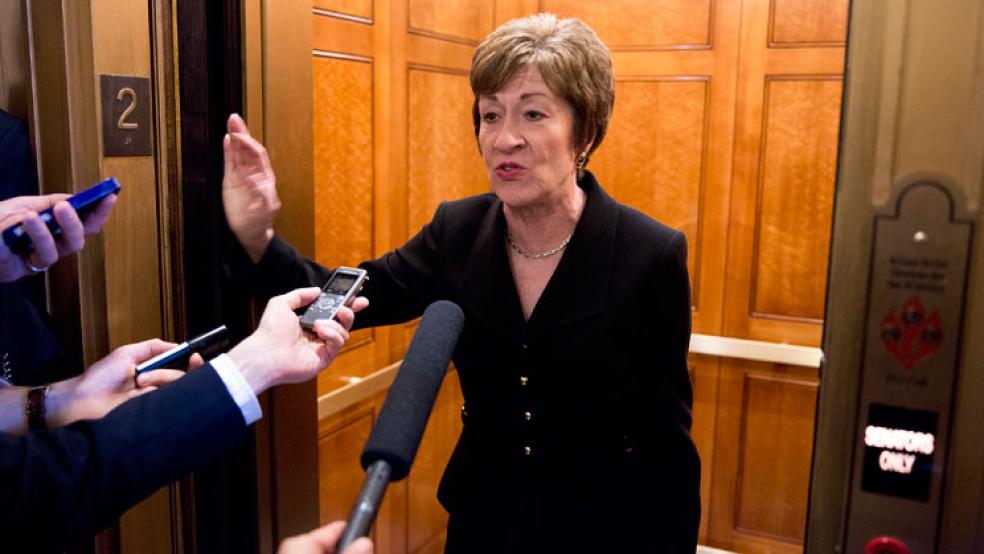While Senate Majority Leader Harry Reid and Minority Leader Mitch McConnell are getting much of the credit for forging the deal to end the government shutdown and avoid a first ever default of U.S. debt, a dozen moderates led by Sen. Susan Collins (R-ME) helped blaze the trail during the worst of the fiscal crisis.
Collins, a New England moderate in her third term, joined forces with freshman Sen. Joe Manchin III (D-WVA) to assemble a Gang of 12 moderates and pragmatists that worked through what became the framework for the final compromise that was approved by the Senate and House Wednesday night.
Collins said yesterday that it was a "truly collaborative effort," adding that all in the group deserved "kudos" for working on the deal, according to USA Today. She said she began the effort on Oct. 5, during a rare Saturday session for the Senate, after listening to speeches in the chamber during the first weekend of the government shutdown that were sharp and partisan..
With the exception of Sen. John McCain (R-AZ) and Collins, the bipartisan group consists of relatively fresh faces in the Senate, such as Manchin, Joe Donnelly (D-IN) and Mark Kirk (R-IL,). More significantly five of the members are women – a fact that underscores the increasingly prominent role that women are playing in the historically male-dominated Senate.
They include Sens. Amy Klobuchar (D-MN), a former prosecutor and the first woman ever elected to the Senate from Minnesota; Heidi Heitkamp (D-ND), a former state attorney general; Kelly Ayotte (R-NH), a fast-rising senator on the Armed Services Committee; and Republican Lisa Murkowski of Alaska, the daughter of a former senator and governor and a wily politician in her own right. She became only the third person ever to win a Senate election through write-in votes after losing the primary in 2010.
Collins, a one-time congressional aide who has served in the Senate since 1997, has frequently voted with Democrats, including on the highly controversial 2009 stimulus package. She is one of the last survivors of a once flourishing group of moderate Northeast Republicans.
Her group has been closely involved in talks to end the government shutdown since late last week, when members unveiled a proposed agreement that would have extended the Treasury’s borrowing authority until Jan. 31 and kept the government operating through March. By contrast, the final agreement fashioned by Reid and McConnell will raise the debt ceiling until Feb. 7 and keep the government operating through Jan. 15.
Democratic leaders rejected the Collins group’s proposal last weekend because it would have allowed a new round of sequester cuts to take effect in January. The Reid-McConnell plan will create a bicameral, bipartisan committee to work out a larger budget agreement that likely will include a replacement for the across-the-board sequester with other savings.
But Collins persisted in pressing for a bipartisan compromise, even after House Republicans nearly brought negotiations to a standstill on Tuesday, with an ill-fated last attempt to add anti-Obamacare measures to an agreement.
"I do think it's possible, although I am worried that the plans have some significant differences," she told reporters on Tuesday. "I think it's possible, but I think it will be late on Thursday. Very late. Right up to the last moment."






